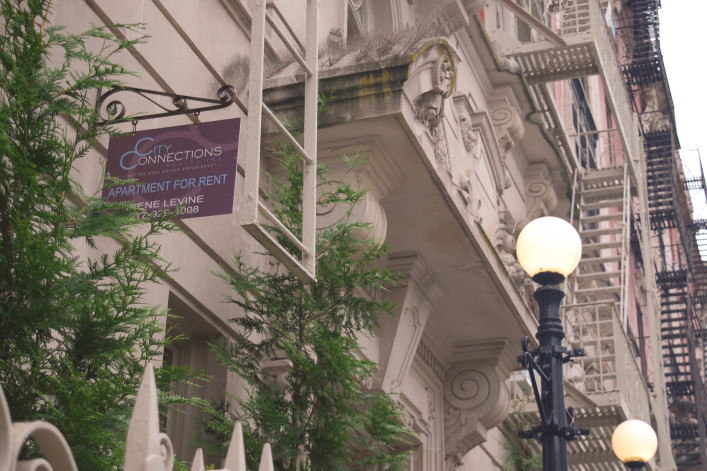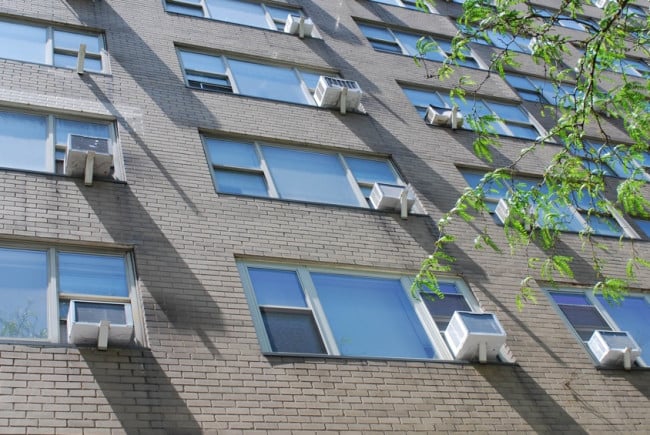What fees do you pay when renting a NYC apartment?
- Broker fees range from one month's rent to 15 percent of your annual rent
- Application fees are $20 for rental buildings, can be more in co-op or condo buildings
- A late rent fee is $50 or 5 percent of the monthly rent, whichever is lower

If you rent in a luxury building, you may have to pay an amenity fee regardless of whether you use the amenities.
When you rent in New York City, there can be an upfront cost just to get the apartment—the broker's fee—which can really add up when you consider you also have to put down your first month's rent and security deposit. Then there are additional, ongoing fees, for example, to use the amenities, keep a pet, or if you need a lease guarantor.
These fees can be painful—and part of the (many) reasons why renting here is so expensive. Be sure to factor them into your budget when you start your apartment search so you're not faced with an unwelcome surprise later, or worse, unable to move forward on an apartment that you want.
What you pay also depends on the type of building you rent in (if you rent in a co-op or condo there are additional fees) and whether you found a no-fee apartment. Read on so you know what to expect.
[Editor's note: A previous version of this post was published in September 2019. We are presenting it again in case you missed it.]
1) Broker fee: At least one month's rent
A broker’s fee for a rental typically ranges from one month’s rent to 12 to 15 percent of a year’s total rent, so for a $3,500 apartment, your broker fee could be as much as $6,300. While this certainly stings, a broker who puts the work in for you doesn't do it for free.
Stan Broekhoven, a broker with Keller Williams, says for a 15 percent broker fee he is able to fully prepare clients with information about the paperwork they'll need, show them multiple apartments that fit their criteria (up to 15 in a day), be present at the lease-signing, and negotiate on their behalf.
If you are using an agent, it's worth asking them if a landlord is paying them any fees to to find tenants and ask to deduct that amount from your broker fee. Also bear in mind: The broker fee is a one-time payment and you don't pay it again if you renew your lease or bring in a roommate.
Keep in mind you'll have more leverage with the broker fee in a slower rental market and right now landlords have the upper hand, although seasonally you'll have more negotiating power in the winter.
Need help finding a landlord who is flexible about guarantors, work history, rental history, or "flexing" your space with temporary walls? Place your search into the capable hands of The Agency, a tech-savvy real estate brokerage that's helped hundreds of Brick Underground readers find their ideal NYC apartments. Bonus: The agents at The Agency are not only a delight to deal with, they will charge a broker's fee of 10 percent of a year's rent on open listings instead of the usual 12 to 15 percent if you sign up here.
2) Application fee: Rent laws limit this to $20...
Changes to the rent laws in 2019 capped the application fee for a rental at $20. This is separate from the broker fee and covers the cost of a background or credit check. This is the only fee a landlord can charge a tenant, and that this is also the maximum brokers can charge for an application fee. If you provide current copies of a background or credit check, the law states this fee must be waived. (Overcharged for a rental application fee? You can file a complaint.)
You may encounter a landlord who is still asking for $100-$150 as an application fee. This is illegal but puts a potential tenant in a difficult spot. "The reality is [tenants] don’t want to lose the apartment over $80 so they are at the mercy of the landlord's requirements," Broekhoven says.
...except if you are renting in a co-op or condo
Some co-op or condo boards impose fees on an apartment owner for renting out their apartment—including higher application fees. That’s because the building isn’t primarily a rental building and within the proprietary lease of a co-op, there will be rules about subletting. The fees can be calculated as a percentage of an apartment’s monthly maintenance fees or might be based on the share allocation of the apartment. The fee might also include costs associated with your move, like elevator use for a morning to get your furniture installed. Owners are able to pass on these sublet fees to the tenant.
Broekhoven says he has seen co-op and condo fees for renters range from $350 to $3,500. Keep in mind that some high-end NYC co-op boards also charge renewal fees so ask about this before you sign.
3) Pet rent: Can be $50 to as much as $200 a month
Even if you are moving into a pet-friendly apartment with your cat or dog, you're not supposed to be asked to pay more than a month’s security. To get around this, landlords often roll the pet fee into the rent, which can be $50 per month per dog and as high as $200. "Cats are usually fine but owners are worried about damage to doors and floors if a tenant has a dog," Broekhoven says.
You still may encounter a (hefty) one-time pet fee. The Aldyn, for example, charges a one-time fee for a dog or cat of $500 at move in and $75 per month.
4) Guarantor fee: 65 to 85 percent of a month’s rent
Leasing agents and brokers have told Brick Underground that changes to the security deposit rules are making it more difficult for students and foreign nationals and those without U.S. credit history to secure a rental. In the past, they might had to pay a larger security, but without that option, owners will now insist on a guarantor, someone who promises to honor the lease if the tenant can't.
An institutional guarantor like Insurent (a Brick Underground sponsor), is another solution. With Insurent, you’ll pay 65 to 85 percent of a month’s rent if you have U.S. credit, and about a month’s rent if you are foreign with no U.S. credit.
5) Rental insurance fee: About $125 a year
Some buildings make it mandatory for tenants to take out renter's insurance. You'll be asked to supply the paperwork as part of your package at lease signing. Renter's insurance isn't a high cost, it's generally around $100 to $150 a year, Broekhoven says, but it is yet another fee you'll need to budget for.
6) Amenity fee: From $500 to $1,000 annually
Renters might expect to pay for amenities in newer, luxury properties. Some management companies will separate the costs of a gym, for example, to keep the base rent more affordable.
Brick has seen amenity fees run from $500 to $1,000 annually, and there are some that charge $100 per month.
Amenity fees "may be charged monthly or upfront annually, and depending on the building, might be offered on an opt-in basis or they may be added to the balance of all new tenants’ rent bills, regardless of whether they choose to take advantage of the amenities the building offers," says Brian Hourigan, managing director at BOND New York.
7) Move-in fee: $500 to $1,000 in a condo or co-op
In the past, the big residential rentals might have charged a move-in fee or a fee to use the elevator when you are bringing in your furniture on move-in day. Adam Frisch, senior managing director at Mantus Real Estate, says these costs could run to anywhere between $500 to $1,000. Based on the new rent laws and a Department of State memo, the only way a move-in fee would be permissible is if it was a fee paid to a co-op or condo board.
Late rent fee: $50 or 5 percent of the monthly rent
Once your tenancy is underway, you can only be charged for late payments if you are five days late with your rent. If you are charged, it can’t be more than $50 or 5 percent of the monthly rent, whichever is less.
If you think you’ve been unfairly treated as you navigate getting yourself a rental apartment, you can make a formal complaint against a broker or landlord.
You Might Also Like



























